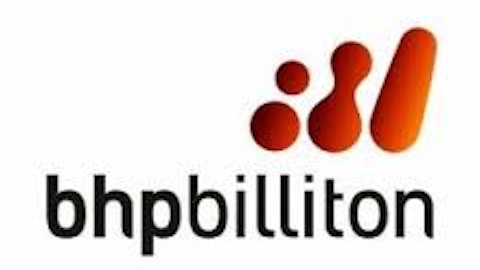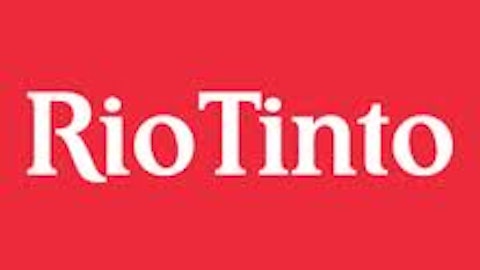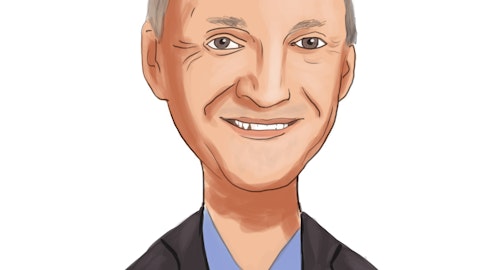BHP Billiton plc (ADR) (NYSE:BBL) is the largest publicly traded mining corporation in the world. The mining behemoth is one of Australia’s top dividend stocks.
The downturn in metal and energy prices has deeply affected BHP Billiton’s operations. The company’s share price has collapsed.
BHP Billiton stock is trading around absolute lows not seen since the Great Recession.
Similarly, BHP Billiton doesn’t seem to be very popular among smart money investors and just 20 funds among those tracked by Insider Monkey held shares of the company at the end of September, 2015. These funds amassed just 0.30% of the company’s outstanding stock. In the current round of 13F filings, Simon Sadler’s Segantii Capital disclosed holding 2.80 million shares of BHP as of the end of December.

Source: Finviz
Despite the decline in metal and energy prices, BHP Billiton has not cut its dividend.
Yet…
This article takes a detailed look at BHP’s:
– Current dividend yield
– Dividend history
– Likelihood of a dividend cut coming soon

BHP’s Dividend Yield
It’s not surprising that dividend investors are interested in BHP Billiton. The company has an exceptionally high dividend yield.
BHP Billiton plc (ADR) (NYSE:BBL) stock currently has a dividend yield of 12.1% (no, that is not a typo). The company is among the highest yielding large cap stocks.
There are only 9 other publicly traded stocks in the United States with market caps above $10 billion and dividend yields above 10% :
– Vale (VALE) has a 11.9% dividend yield
– Ecopetrol (EC) has a 16.6% dividend yield
– KKR & Co. (KKR) has a 10.8% dividend yield
– Vodafone (VOD) has a 12.0% dividend yield
– BHP Billiton (BHP) has a 10.9% dividend yield
– Telecom Italia (TI-A) has a 11.6% dividend yield
– Banco Bradesco (BBD) has a 11.8% dividend yield
– Banco Santander (BSBR) has a 12.6% dividend yield
– Petroleo Brasileiro/Petrobras (PBR-A) has a 11.0% dividend yield
Yields of 10%+ are unusual for shareholders of BBL. The stock’s dividend yield has slowly risen over the last 10+ years.
BHP’s Dividend History
BHP’s management has steadily increased its dividend payments over the last decade.

Rising dividend payments and the steep share price declines have resulted in double digit dividend yields.

The company’s high dividend yield is appealing to dividend investors – on the surface.
It’s important to note the unusual tax characteristics surround the company’s shares.
Follow Bhp Group (NYSE:BBL)
Follow Bhp Group (NYSE:BBL)
Receive real-time insider trading and news alerts
BBL & BHP: Dividend Withholding Tax Info
BHP Billiton (the company) trades under two different stock tickers: BHP and BBL.
– BHP is based in Australia
– BBL is based in the United Kingdom
BBL is the preferable investment for United States investors.
Here’s why. Australia has a dividend withholding tax on United States investors. The United Kingdom does not.
BBL is the preferable investment if you want your dividend income coming to you instead of to a government.
The Australian shares offer something called a ‘franking credit’. This term is likely unfamiliar to United States investors. Franking credits allow for tax deductions from other investment income generated in Australia. Franking credits are worthless, unless you have significant Australian investment income.
Tax issues matter. What matters far more is whether BHP Billiton will cut its dividend soon.
Likelihood of BHP Cutting Its Dividend
For a company to pay steady or rising dividends it must have:
1. The ability to pay the dividend
2. A management willing to do so
The oil and gas super majors are in a similar situation. Click here to see how the 6 oil and gas super majors are handling their dividend policies.
BHP Billiton’s operations are struggling. The company no longer has the ability to pay its dividend from current earnings because of commodity price declines.
– BBL has $1.28 in earnings-per-share
– BBL pays $2.48 in dividends per share
Results are expected to be worse in 2016 than 2015, assuming commodity prices don’t surge. As a result the company will have to weaken its balance sheet to pay its dividend.
The company has $2.33 in cash per share. This is not enough to cover the dividend for even one full year.
BHP’s management will have to raise debt to fund its dividend.
The question is, will BHP’s management prioritize its balance sheet or its dividend?
BHP Billiton Chairman Jac Nasser was very clear on the subject. Here’s what he said in the company’s November 2015 General Meeting (emphasis added):
“I thought it would be helpful to address questions which the Board and management have received about our dividend.
As I said at the London AGM, the dividend is an outcome of appropriate capital management. Our starting point is to maintain the strength of the balance sheet through the cycle. The balance sheet must always come first.
As you would expect, and has always been the case, your Board reviews the level of dividend on a regular basis. It does this against the background of the external environment, our progress on capital and operating productivity and the need to invest to ensure profitable long-term growth.”
There should be no confusion about what management prioritizes after reading the quote above. The balance sheet comes first. BHP Billiton will cut its dividend before it damages its balance sheet.
On February 1st S&P lowered BHP Billiton’s credit rating from A+ to A. The company has been placed on a credit watch.
Reducing or eliminating the company’s dividend payments would likely prevent further credit downgrades.
BHP Billiton is under pressure to reduce or eliminate its dividend. I believe it is extremely likely the company cuts its dividend based on management’s comments.
I expect the dividend cut announcement to come on February 23rd. This is when the company releases its interim results.
Final Thoughts
BHP Billiton plc (ADR) (NYSE:BBL) is deeply undervalued relative to its long-term earnings power. The metal and energy price collapse has temporarily slashed BHP Billiton’s earnings.
Patient value investors will likely do well to purchase BHP Billiton at current prices.
Investors seeking reliable dividend income should stay away from BHP Billiton. The company is very likely to cut its dividend in the near future.
The company does not rank well using The 8 Rules of Dividend Investing because of its high volatility and unsustainable payout ratio.
Disclosure: None




